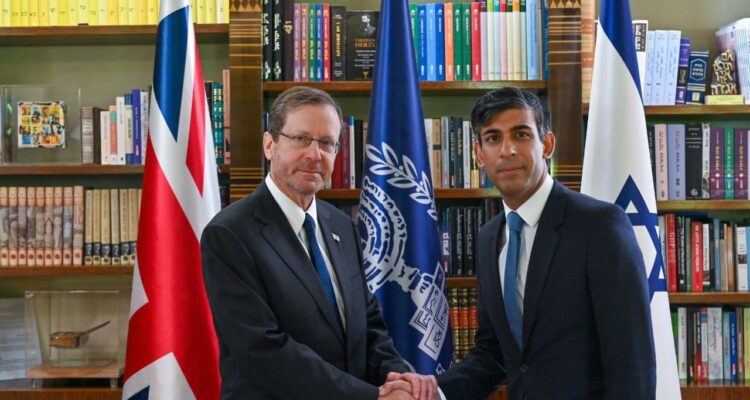Rishi Sunak meets with President Isaac Herzog day after President Biden’s visit.
By Batya Jerenberg, World Israel News
UK Prime Minister Rishi Sunak said Thursday during a solidarity visit to Israel that the BBC should start calling Hamas a terrorist organization, something the broadcaster has consistently refused to do.
Israeli President Isaac Herzog met with Sunak Thursday, a day after President Joe Biden made a similar solidarity visit.
During their meeting, Herzog urged the British premier to join growing calls for the BBC to refer to Hamas as a terrorist organization in its reports, rather than as a “militant” group.
“I want to raise the issue of what I call objective or not objective reporting about this tragedy because we feel that – and I’ve made it public – the way the BBC characterized Hamas, this is distortion of the facts,” Herzog said.
“We are dealing with one of the worst terrorist organizations in the world. And I know that in modern democracies, like ours and yours, you can’t interfere per se, but since the BBC has a certain linkage and as is known as British all over the world, there has to be an outcry for it to be corrected, and that Hamas will be defined as a terrorist organization there as well. What else do they need to see to understand that this is an atrocious terror organization?”
Herzog was speaking diplomatically, as there is more than a “certain linkage” to the government. The BBC is funded principally by an annual license fee which is charged to all British households, companies, and organizations. Another “significant” donor the BBC acknowledges is the UK Foreign, Commonwealth and Development Office.
Sunak answered, “You have suffered something unspeakable, a barbaric act of terrorism, as you said, we should call it what it is: an act of terrorism perpetrated by an evil terrorist organization, Hamas. That’s what I believe. And that’s what we will continue to say.”
The premier used the word again after meeting with some parents of the 203 people so far confirmed as kidnapped by Hamas on the first day of the ongoing war, including the children and babies.
“To have a child taken from you is a parent’s worst nightmare,” he posted to X. “This morning I heard from families going through this unbearable agony. Working with our partners, we’re determined to secure the release of the hostages taken by Hamas terrorists.”
Around a thousand people protested outside BBC headquarters in London Monday, demanding that its reporters use the word “terrorists” to describe Hamas rather than the whitewashed term “militants.”
The outlet’s Arabic channel has reporters who have gone further, liking posts on X that celebrated the Hamas slaughter of 1,400 men, women and children in Gaza envelope communities and at a dance rave on October 7, which led Israel to immediately declare war on the terrorist organization.
Back in June, MK Ohad Tal had written to the broadcaster to protest the way it described Israeli villages in Judea and Samaria, noting that “If ‘settlements’ are consistently presented as illegal, then a fortiori, terrorism should certainly be presented as illegal.”
BBC Deputy CEO Jonathan Munro had responded, “We would argue that this is false equivalence and they are two entirely separate issues,” he responded. “The BBC doesn’t change the word ‘terrorist’ or ‘terrorism’ when quoting other people. But at the core of the policy is the decision – taken many years ago – not to label people, groups or acts as ‘terrorist.’ This is because the word ‘terrorism’ means different things to different people and a universal definition is always out of reach.”
Sunak also uttered strong words of support for Israel, saying, “We will stand with you in solidarity with your people and your right to defend yourself, to bring security back to your country, to your people, to ensure the safe return of the hostages that have been taken. You have not just a right to do that, I think you have a duty to do that, to restore that security to your country.”





